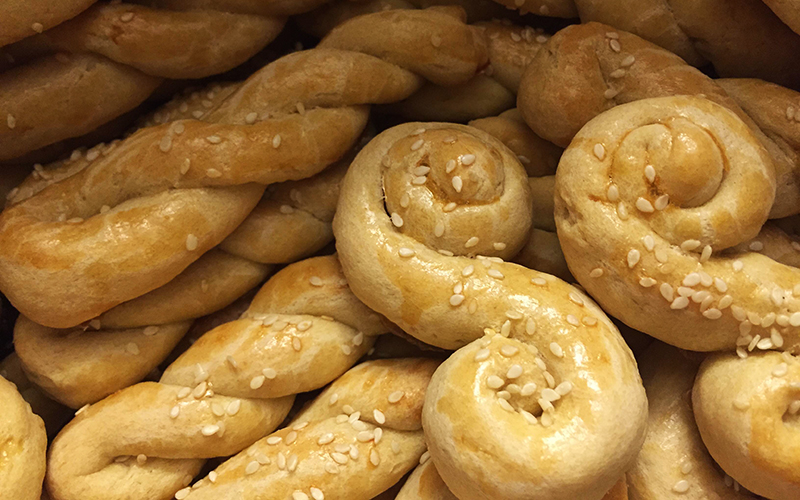
by guest blogger Katina Simonetta Jenkins, merchandising coordinator at Rodale’s
What comes to mind when you think of Greek cookies or pastries? Let me guess…baklava? Baklava is delicious, but there are so many other delectable Greek desserts to choose from!
Koulouria are my favorite Greek cookies to make (and among my favorite to eat). You might also see them called koulourakia, a diminutive that means “little koulouria.” Be careful not to confuse koulourakia with koloraki (as my husband once mistakenly did), which is the Greek word for rear-end.
Koulouria facts:
- These cookies have been traced back to Crete during the Minoan period, although they have been made throughout Greece for a long time.
- The root of the word koulouria roughly translates to “rusk” or “biscuit.”
- These are fun to make with kids because you can easily split up the tasks (for instance, one child rolls the dough into shapes, one lathers with the egg wash, while another sprinkles with the sesame seeds).
- These are typically made during Easter time, but they are a welcome treat at any cause for celebration (of which the Greeks have many).
- A type of butter cookie, koulouria are best served with coffee!!
- Some adventurous Greek bakers even make these cookies with a hint of Greek cognac or ouzo!
Koulouria
Makes about 150 cookies (for that big Greek family)
Ingredients:
- 1 pound butter
- 1 pound vegetable shortening
- 8 eggs
- 2¼ cups sugar
- 1½ cups orange juice
- ½ cup milk
- 8 teaspoons baking powder
- 1 teaspoon baking soda
- 6 pounds flour
- 3 teaspoons vanilla
- 2 additional eggs, beaten and set aside in a separate bowl (for egg wash)
- Sesame seeds (for topping)
Directions:
- Mix everything except the flour with a beater then work in the flour using your hands or a wooden spoon.
- Roll the dough into shapes, brush on the egg wash, and sprinkle the cookies with sesame before baking at 325 degrees.
- Bake for 15 to 20 minutes, and then watch until the cookies become golden (see now on doneness below).
Tips:
- Don’t add all 6 pounds of flour at once. Add a little at a time. Typically, you end up using a little more than 5 pounds. Test the dough by rolling a piece to make sure it’s not too sticky but not too dry and cracking.
- If using a standing mixer, mix half the recipe at a time.
- Traditional shapes can be made to look like twists (the most popular), S’s, circles, braided twists, Greek letters, or the tops of Ionian columns (my favorite)!
Advice on Doneness:
When I asked my grandmother how long I should bake the cookies…
Me: Yiayia, how long do I bake these cookies?
Yiayia: You bake them until they’re done.
Not everyone has the baking wisdom of a Greek yiayia…so I’ll translate:
- The first batch will take longer.
- Switch trays from bottom to top halfway through baking.
- Bake for 15 to 20 minutes (noted above) then wait until they are slightly golden on top.
- Err on the side of not overcooking! These are better a little doughy than they are crispy!
 Before Katina Simonetta Jenkins became the merchandise coordinator for Rodale’s, she dabbled in secondary English education, bridal and jewelry sales, and dance performance. Katina spends her free time hiking, dancing, reading, organizing everything, swimming, writing, DIYing, entertaining, and shopping for groceries in her own backyard. When she isn’t cooking wholesome and frequent meals for her hungry hubby and her, ahem, involved (and amazing) family, she can be found tending to her plants and caring for Phoenix, her Aussie puppy, and Poseidon, the family hermit crab.
Before Katina Simonetta Jenkins became the merchandise coordinator for Rodale’s, she dabbled in secondary English education, bridal and jewelry sales, and dance performance. Katina spends her free time hiking, dancing, reading, organizing everything, swimming, writing, DIYing, entertaining, and shopping for groceries in her own backyard. When she isn’t cooking wholesome and frequent meals for her hungry hubby and her, ahem, involved (and amazing) family, she can be found tending to her plants and caring for Phoenix, her Aussie puppy, and Poseidon, the family hermit crab.




I love this site – it’s the only site I know where the food tastes as hot as the chef looks!
I don’t always get the recipes right – indeed I have been told I cook fit for the Gods – burnt offerings all the way – but I DO learn and the lady’s smile always means I’ll be back to try again.
Thanks for all the little stories, the great recipes – and for not eating Poseidon! Me, I never touch seafood because fish are the only animals that are routinely tortured to death – imagine a fish catching you and you being left in a pile of humans to slowly drown – fish ‘drown’ in air because they can’t breath it – or shoved into a volcano alive – when shellfish are dropped in boiling water you can hear them scream, no that’s NOT just air escaping! – and you’ll see what I mean. Poseidon’s a great reason for using this site!
Thanks for your smile and all the recipes.
Chris.